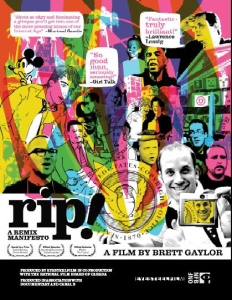
Movies
Reviews

Review: RiP: A remix manifesto
Filed under: Reviews
I'll be honest: when I first glanced at the press material for RiP: A remix manifesto I was filled with dread. The words "political documentary" jumped off the page, eliciting memories of recent entries to the genre: Who Killed the Electric Car, Why We Fight, and the infamous Zeitgeist (the latter could better be described as distilled conspiracy theory zeal than documentary). The filmmakers' strategy is to prove an enormous societal truth by obliquely piecing together snippets of talking heads, sound bytes and archival footage. All the while, seemingly innocuous, unbiased text narrates, tying everything together and appropriating meaning. The effect is so mild, so non-confrontational and so boring that the audience perceives it must be true. In reality, this is a great con -- subjectivity seamlessly masked as objectivity. I would say this tactic is dangerous; however, the only people who see these movies are those already in explicit agreement with the filmmakers; people who enjoy the self congratulatory sentiment that they have endured something "important."
That having been said, I am pleased to announce that RiP: A remix manifesto, possesses no pretenses of objectivity (after all, the word "manifesto" is in the title!). Brett Gaylor, the filmmaker and self described "new media director" takes on the task of narrating his own movie. His delivery style blends contained passion with sardonic wit, similar to fellow subjective documentarian, Michael Moore, only without the bloated aura of self-importance.
The film takes on the huge media conglomerates that own the copyrights to millions of songs, images and characters, all of which they guard jealously. With the discretion and tenacity of Saint Peter at the gates of Heaven, they sanction use of copyrighted material only to those sainted few blessed with an abundance of . . . money. Gaylor views this ownership of artistic and intellectual property as both absurd and immoral. He argues that art is as much about conversation as it is about innovation, with each generation building upon and commenting upon the works of those who came before. It follows that he supports a musician's right to sample Elton John, an artist's right to draw Mickey Mouse, and his own right to superimpose a Sesame Street character's head onto news footage of George Bush. All, of course, without fear of a lawsuit.
What I admire most about this film is that it has the courage of its convictions: it collages hundreds of copyrighted images and songs together in creative and new-fangled ways, practically daring media executives to sue. Gaylor achieves political credibility by allowing leaders of the "copyleft" movement like Lawrence Lessig, (law professor, friend of Barack Obama and founder of Creative Commons, an organization devoted to promoting artistic sharing) a lot of time to make their points.
Serving as the human embodiment of the film's message and its strongest argument, is musician or laptop DJ (depending on who's defining), Girl Talk a.k.a. Greg Gillis. His 2006 CD release of pop music mashups, Night Ripper, wowed critics and scenesters alike, in addition to finally giving hipsters a reason to dance. Though he does not compose a single note of original music, he condenses, rearranges and combines hit songs in unpredictable ways -- his work tears away the cellophane to capture those moments of poetic feeling, exuberance and raw emotion that survive the equalizing filter of big shot corporate producers. Whatever your opinion of his art, the fact remains that it is art, and at that, original art -- he uses samples like other musicians use a guitar and drums.
There are a few missteps towards the end when the film becomes overly broad and attacks every aspect of copyright and patent laws, from pharmaceutical drugs to GMOs. Overall, however, it is a strong and entertaining argument for "free use." My only serious complaint regards timing. Shouldn't this movie have been released ten years ago? I realize record companies are still hounding illegal downloaders, but with significantly dampened spirits and half their former fanaticism. The fact that Girl Talk has (after the release of two popular albums) not been sued is testimony to the evolution of society's attitude towards copyright laws.
A matter of fact, an earlier documentary serves to illustrate what happens to those who refuse to evolve. Joe Berlinger's and Bruce Sinofsky's, Metallica: Some Kind of Monster (2004) documents the once "greatest living rock band" as they deteriorate into bitter has-beens after their personal crusade to shut down Napster and strictly enforce copyright laws. They came from an era of Rock Gods who ruled as Titans amongst men; a world where America's number one material girl, Paris Hilton would never be caught dead hanging out with a weedy geek like Girl Talk. For obvious reasons they struggled to halt the democratization of music and, as a result, lost the majority of their fans. In Some Kind of Monster, rock and roll hall of famers, Metallica, are reduced to a pack of squabbling children, and the audience is served a poignant reminder of what happens when you fight the tide of change. Let's face it: the downloaders, culture borrowers, song stealers, "new media directors", whatever you want to call them, won the war. Big time.
Tags: documentary, Girl Talk, Lawrence Lessig, Brett Gaylor
Related Posts
- Review: Stan Lee
- Punch Up Your Life - The Height of Depression (Ryan Sheedy)
- Punch Up Your Life - Blacked Out (Chris Middleton)
- Punch Up Your Life - DisFUNction (Hools Kay)
- Punch Up Your Life - The Assorted Spectres of Saint John's Road (Isabel Zaw-Tun)







Original Comments Posted (1)
sarahm says...
Great review! I really want to see this movie because copyright is one of those political issues that is near and dear to my heart. Lawrence Lessig (and Michael Geist- Canada's Lawrence Lessig) is my hero. I think that it is timely though because even though the whole big-headline-record-company lawsuits are mostly over, governments are still working on developing copyright policy (especially in Canada and Bill C-61 last year). Especially as the internet continues to grow and change, copyright laws have the potential to touch on everything we do. Like the Facebook terms of Use thing that happened a few weeks ago shows us, content ownership is a big issue for people. I can't wait to see this documentary.
Mar 20, 2009 3:27pm
Comments Posted (